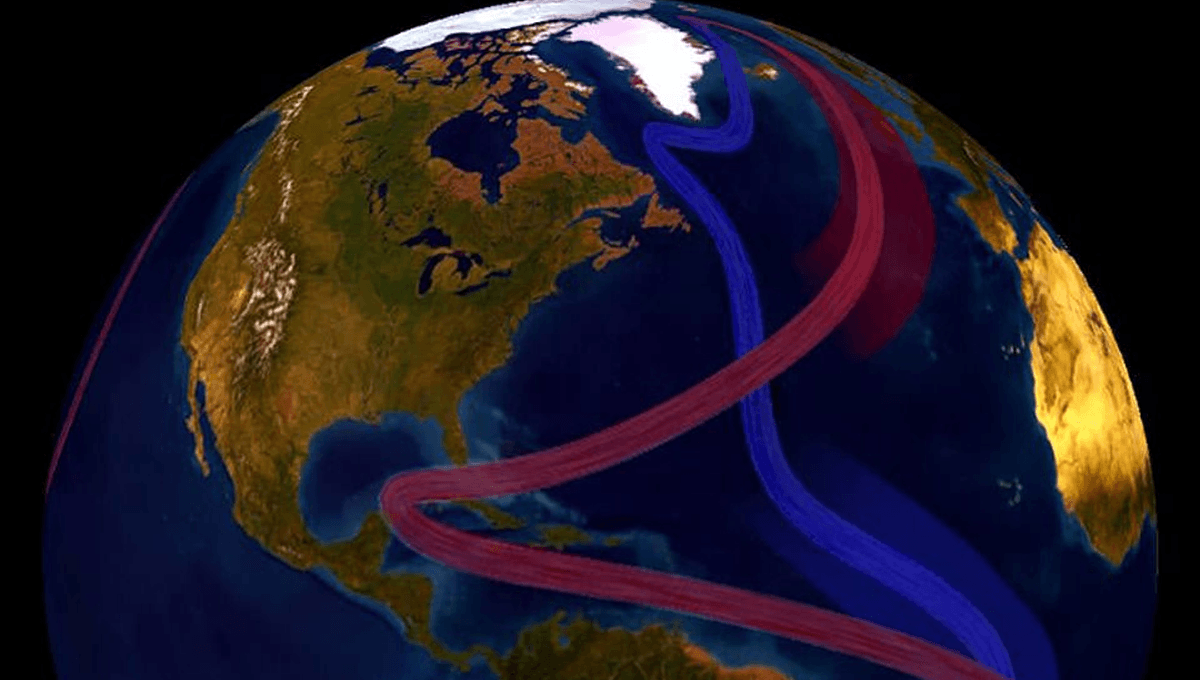
The Atlantic Meridional Overturning Circulation (AMOC), “the conveyor belt of the ocean” that carries warm water from the tropics northwards into the North Atlantic, is potentially facing collapse within the coming decades, according to a new study. If we keep pumping out fossil fuel emissions at the current rate, this dramatic halt could occur around the middle of the century – or potentially as early as 2025.
Western Europe’s relatively warm climate is largely thanks to the AMOC, also known as the Thermohaline Circulation, which transfers warm and salty surface water from the tropics through the North Atlantic. When it approaches the North Pole, it cools and forms sea ice. The remaining water then sinks down and is carried southwards in the depths below, completing the cycle.
However, scientists are now warning that it’s likely this vast oceanic conveyor belt could grind to a stop in this century as a result of climate change.
In a new study, two scientists from the University of Copenhagen predict with 95 percent certainty that the AMOC will collapse between 2025 and 2095 if current greenhouse gas emissions persist. This will most likely occur in 34 years, around 2057, they say.
While climate change is set to continue to raise average temperatures globally, this phenomenon means that parts of Western Europe could actually be hit by cooling. However, this won’t be a saving grace; the end of the AMOC could ultimately result in increased warming of the tropics and further knock-on effects around the world.
“Shutting down the AMOC can have very serious consequences for Earth’s climate, for example, by changing how heat and precipitation are distributed globally. While a cooling of Europe may seem less severe as the globe as a whole becomes warmer and heat waves occur more frequently, this shutdown will contribute to an increased warming of the tropics, where rising temperatures have already given rise to challenging living conditions,” Professor Peter Ditlevsen, study author from the Niels Bohr Institute at the University of Copenhagen, said in a statement.
It’s important to note that these findings contrast with the findings of the Intergovernmental Panel on Climate Change (IPCC), the United Nation’s program that was created to reflect the status quo of climate science. The recent IPCC assessments have suggested that a full collapse of the AMOC is unlikely within the 21st century.
Yet this new study argues instead that a collapse is highly likely in this century. For the study, the team analyzed sea surface temperatures in a specific area of the North Atlantic from 1870 to the present day as a proxy for the flow of the AMOC. Combined with fresh statistical analysis, the team claims this has provided a more “robust” estimate than previous work.
“Using new and improved statistical tools, we’ve made calculations that provide a more robust estimate of when a collapse of the Thermohaline Circulation is most likely to occur, something we had not been able to do before,” explains Professor Susanne Ditlevsen of the University of Copenhagen’s Department of Mathematical Sciences.
It is far from the first warning that the AMOC is facing deep trouble. One recent study found that the stream of the AMOC is slowing down and at the weakest it’s been for 1,000 years. The course of action to avoid this fate is to stop fossil fuel use with immediate effect, but global action to achieve this is proving slow, despite the high stakes.
“Our result underscores the importance of reducing global greenhouse gas emissions as soon as possible,” added Professor Peter Ditlevsen.
The study is published in the journal Nature Communications.
Source Link: Atlantic Ocean Current May Face Collapse In Just Decades, Maybe Years